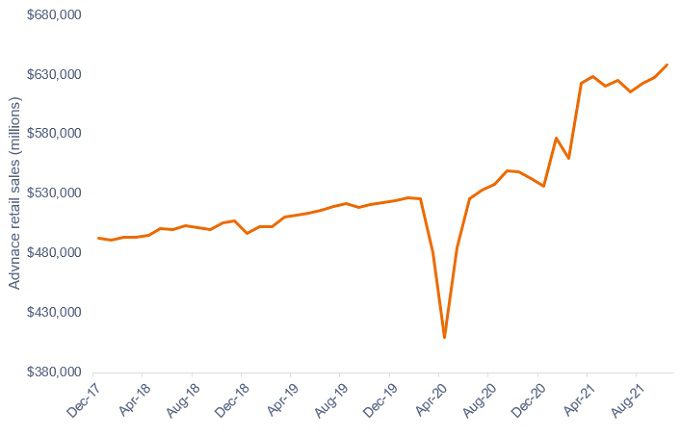Subscribe
Sign up for timely perspectives delivered to your inbox.

In the face of ongoing market risks, Portfolio Manager Jeremiah Buckley remains bullish on US equities and expects many long-term growth themes to endure.
The COVID Delta variant has slowed an already complex economic reopening. Supply chain and labour market difficulties – which have persisted for longer than we and most investors initially expected – have conspired to stoke inflation. Despite these challenges, we continue to see momentum building in the economic recovery.
2021 has seen a meaningful rise in inflation as measured by the Consumer Price Index (CPI), but other key economic indicators such as employment, labor force participation, reltail sales and Purchasing Managers’ Indices (PMIs) continue to trend in a constructive direction. For the U.S. economy, which is heavily dependent on consumer spending, retail sales numbers have been particularly encouraging as the holiday shopping season begins. October advance retail sales rose a seasonally adjusted 1.7% over the previous month1, showing consumers’ willingness and ability to spend are strong despite inflationary headwinds.

Source: US Census Bureau, Advance Monthly Sales for Retail and Food Services, Monthly, Seasonally Adjusted, as at 17 November 2021.
Indeed, it is our belief that high levels of consumer savings, significant appreciation in the equity and housing markets and stronger employment growth will allow consumers to drive robust spending in the upcoming quarters. Ongoing vaccination, the development of additional medical advancements to treat COVID-19 and moderation of the Delta variant should gradually result in more people rejoining the workforce and help alleviate current supply chain constraints. And while some residual inflationary effects may persist, we believe most of the recent rise in the rate of inflation will prove to be transitory. Furthermore, absent significant data surprises, we think the Federal Reserve (Fed) will continue to display patience and err on the side of stronger economic growth, rather than preemptively raise interest rates.
Thus, while markets have traded at or near all-time highs in recent months, we remain bullish on U.S. equities, particularly relative to fixed income, where spreads remain at historically tight levels. Though Treasury yields increased as the Fed began to signal the potential for a less accommodative policy, the S&P 500® Index earnings yield continues to look relatively attractive versus the 10-Year Treasury yield.
Many of the long-term growth themes that were in motion prior to the pandemic ‒ and that have accelerated as result of it ‒ remain intact. These include the shift to e-commerce and related acceleration in e-payments, the growth of cloud computing and Software as a Service applications, and health care innovation.
Through the pandemic, we have seen select companies with the scale and balance sheet strength to invest in digital transformation efforts achieve market share gains that would have taken multiple years to achieve in a more normal market environment. We see opportunity for digitization to continue to drive growth across economic sectors, including less obvious segments of the market such as industrials. For instance, we believe that spending on supply chain infrastructure and automation of manufacturing processes can fuel growth for companies catering to those trends, and that this growth potential may not be fully recognized by the market.
We have seen a solid rebound in cyclical sectors during the economic recovery, but we believe that investors must be selective in their exposure to these areas. Many names in the materials and capital goods segments have recovered to well above pre-pandemic values due to a rapid rise in commodity prices. We believe these areas warrant caution as the market determines whether supply and demand imbalances will persist and whether commodity prices will remain elevated.
Within the travel industry, some companies have recovered and now boast enterprise values that are much higher than they were before COVID hit, even though they could still be years away from returning to pre-pandemic profits and cash flows. In contrast, some companies with stronger balance sheets have been able to invest and grow market share rather than having to focus on deleveraging as they emerge from the pandemic.
Thus, while we are aware of ongoing risks that remain, we still see material opportunity in the market. We will continue to monitor input cost and labor inflation and how these factors will impact corporate margins after years of generally improving profitability. We find it continually important to identify companies with pricing power and durable competitive advantages that can help combat the potential for inflation. We are also mindful of political developments around the infrastructure bill, debt ceiling and tax reform. With respect to tax reform, it will be important to monitor the effects at the consumer level in terms of spending, and at the corporate level in terms of the impact on shareholder returns and future levels of capital investment.
As we navigate a period with the potential for heightened volatility and rising inflation, we continue to believe in the importance of finding companies that are providing meaningful economic value to their customers while continuing to generate consistent free cash flow and allocating capital successfully. We think these companies will be better positioned for long-term growth regardless of any shorter-term changes in the investment environment.